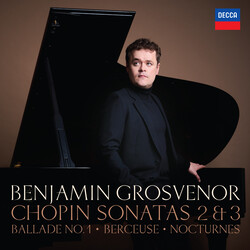Benjamin Grosvenor präsentiert uns einen ungemein erregten, aufgewühlten ersten Satz in der 2. Sonate. Und diese Erregung lässt nicht nach: das Scherzo ist zunächst düster stürmisch, mit lyrischeren Einlagen und einem drängenden virtuosen Schluss. Beginn und Schluss des Trauermarsches sind gefasst und ernsthaft, ohne Trauer, der Mittelteil ruhig und kantabel, alles quasi ausdruckslos. Dann endet die Sonate in einem dahin fliegenden Presto.
Sehr distanziert klingt auch die Berceuse während die erste Ballade längst nicht alles an möglicher Rhetorik und Aussage bringt und letztlich eher langweilig wirkt.
Zwei ruhige Nocturnes führen zur 3. Sonate, die Grosvenor anfangs sehr heldisch charakterisiert, dann sehr zart werden lässt. Das kurze Scherzo ist quirlig bis gefasst lyrisch, das Largo schreitet sachlich dahin, ehe das Finale die Sonate virtuos beendet. Insgesamt bleibt der Eindruck von Eile in Sachlichkeit, von Kraft ohne Leidenschaft.
Ich kann mich für Grosvenors Chopin nicht erwärmen, schließe aber nicht aus, dass es Leute gibt, die diesen Chopin mögen, gerade weil er so wenig nach Chopin klingt.
Benjamin Grosvenor presents us with an incredibly agitated first movement in the 2nd Sonata. And the excitement does not let up: the scherzo is dark and stormy at first, with more lyrical interludes and an urgent virtuoso ending. The beginning and end of the Funeral March are composed and serious, without sadness, the middle section calm and cantabile, all almost expressionless. The sonata then ends in a flying Presto.
The Berceuse also sounds very distant, while the first Ballade is far from reaching its full potential in terms of rhetoric and message, and ultimately seems rather boring.
Two quiet Nocturnes lead to the 3rd Sonata, which Grosvenor characterizes heroically at the beginning and then makes very tender. The short Scherzo is lively to lyrical, the Largo progresses matter-of-factly, before the finale brings the sonata to a virtuoso close. All in all, the impression remains of haste in objectivity, of power without passion.
I can’t warm to Grosvenor’s Chopin, but I don’t rule out the possibility that there are people who like this Chopin precisely because it sounds so little like Chopin.


















